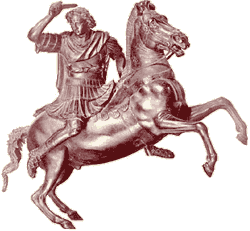Alexander the Great


Alexander's ambition
Growing up, Alexander was fascinated by Homer's Iliad. It was the character of Achilles -- the hero of the story and the exemplar of all manlSometime in his early formative years he decided to model himself after Achilles.
Emulating the famous hero was apparently encouraged by his teacher, the great philosopher Aristotle. According to the Roman historian Plutarch, Aristotle personally annotated a copy of the Iliad for Alexander. Alexander kept it with him throughout all his later travels, even sleeping with it under his pillow.
Alexander's mother, Olympias, clearly encouraged him. This woman couldn't have been more meddling and ambitious for Alexander if she herself were a scheming goddess on Mount Olympus. In fact, she may have consorted with the gods. Or, at least, that's the rumor she spread.
Olympias informed her son that he was actually a descendent of Achilles. And probably Hercules, too. y virtues -- that especially attracted him. And so, in keeping with his family tradition and the great expectations of his mother, Alexander looked for any opportunity to demonstrate his heroic strength and courage.
In one episode, his father -- Philip II of Macedonia -- was considering purchasing a magnificent black stallion. But the horse was too wild. Nobody believed it could be tamed. The 14-year-old Alexander decided he could do it. He leapt onto its back and started a 16-year relationship with the horse, which he named Bucephalas.
As the story goes, Philip was so proud of Alexander that he said to him: "My son, look thee out a kingdom equal to and worthy of thyself, for Macedonia is too little for thee." Alexander inherits a kingdom
When Alexander was 16, Philip made him regent of Macedonia while he was off fighting the Persians. (Nominally at least, Philip's campaign was revenge for Xerxes' Persian invasion of Greece, some 150 years earlier.) While regent, Alexander crushed an uprising in Thrace.
When Alexander was 18, Philip left him in command of the left wing of the Macedonian army at the battle of Chaeronea. The battle was won, thanks in part to a courageous cavalry charge led by Alexander himself.
When Alexander was 20, Philip was assassinated. A guard plunged a spear into his chest. Some say it was a conspiracy orchestrated by Olympias.
And so, Alexander inherited a kingdom.
Alexander conquers his world
Inheriting a kingdom from his father didn't really please Alexander. What kind of hero gets everything given to him? This wouldn't satisfy Achilles or Hercules and it wouldn't satisfy him. The Macedonian empire didn't live much longer than Alexander. After his death his kingdom was promptly carved up into three pieces by his generals.
And the Macedonian people have never seen much peace or freedom. They've been under the feet of ambitious conquerors from the Roman Empire, the Byzantine Empire, and the Turkish Empire. More recently, their country was carved up between the world wars and made a part of communist Yugoslavia.
But Alexander did win his glory. He fulfilled his ambition.
He is quoted as saying, "I would rather live a short life of glory than a long one of obscurity."
That's exactly what he got. 2,300 years later we remember him as a legendary, mythic figure

0 Comments:
Post a Comment
<< Home